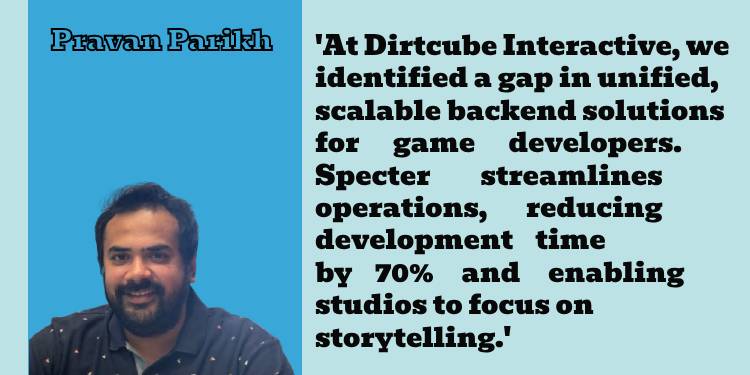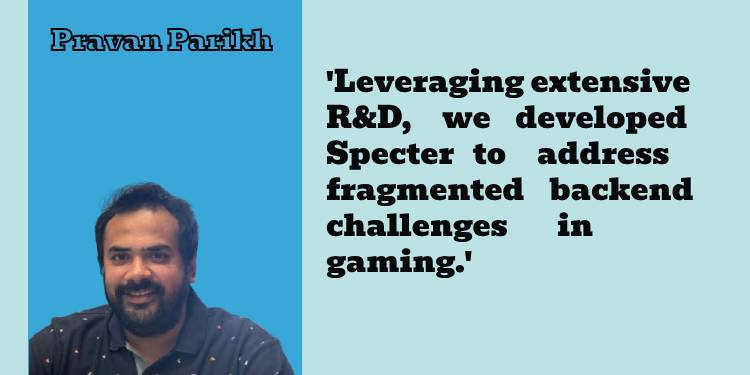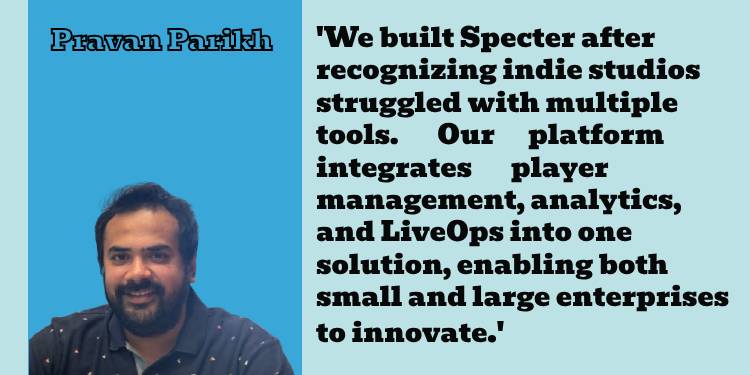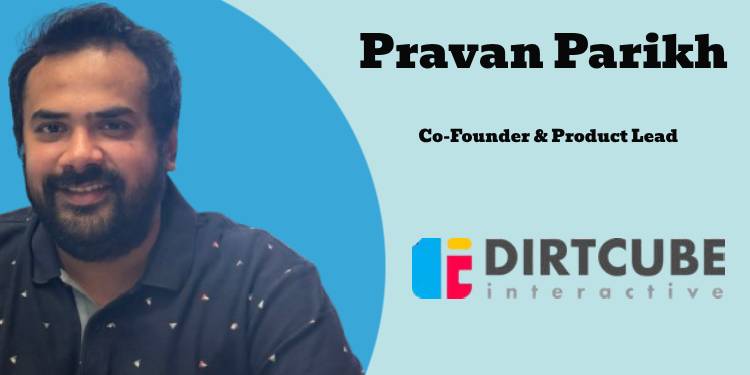Dirtcube Interactive has created Specter—a backend solution designed to empower game developers. Specter addresses some of the most pressing challenges faced by game developers today, offering seamless tools to manage in-game economies, achievements, leaderboards, LiveOps, and much more. With an event-driven system at its core, Specter looks to ensure scalability, security, and efficiency, enabling developers to focus on innovation and delivering exceptional gaming experiences.
The gaming industry is booming, but many developers are held back by backend complexities. Specter offers what the company says is a cost-effective, scalable, and secure solution that has the potential to redefine how games are developed.
Medianesws4u.com caught up with Pravan Parikh, Co-Founder & Product Lead, Dirtcube Interactive
Dirtcube Interactive is headquartered in Navi Mumbai, India. He is committed to building products that enhance digital interaction and deliver immersive experiences.
His journey at Dirtcube Interactive began with Capshot, a social media app that fosters collaborative creativity through memes, short videos, and GIFs. He has since expanded the company’s scope into the gaming industry, overseeing the development of over 15 gaming titles in partnership with top-tier publishers.
Currently, he leads the charge in redefining social and competitive gaming with GameStarz, a platform that blends gaming and brand gamification to create immersive experiences that resonate with users. Alongside this, he has been instrumental in the launch of Specter, an all-in-one backend solution designed to simplify game development. Specter enables developers to focus on crafting engaging stories and gameplay by managing key elements such as game economies, live services, and player progression.
Before founding Dirtcube Interactive, he gained experience across financial services, market research, and product development. His roles at Expanded Polymer Systems, Standard Chartered Bank, Forexserve, and Aryaman Financial Services honed his skills in data analysis, market strategy, and client solutions, laying the groundwork for his entrepreneurial journey.
Q. What was the gap seen in the market that led to the creation of Dirtcube Interactive?
At Dirtcube Interactive, we initially faced the challenge of building and managing a scalable backend infrastructure while developing our own game, GameStarz.
We realised that most game developers, especially indie studios, struggled with the same issue – integrating multiple tools for player management, leaderboards, economy, LiveOps, and analytics.
Existing solutions were either fragmented, too complex, or lacked flexibility. This gap in the market led to the creation of Specter, an all-in-one backend solution that simplifies game development by offering a unified and scalable infrastructure.
Q. How much R&D went into creating Specter to help various companies from game developers to esports organizations to fitness apps?
Specter is the outcome of extensive R&D spanning multiple years. Our team conducted deep research into the common backend needs across gaming, esports, and fitness applications.
This process involved significant exploration, prototyping, and iteration to ensure Specter’s architecture could scale and support diverse real-world scenarios, from basic player management to complex event-driven analytics. AI-driven capabilities are currently in active development, which will further expand Specter’s utility in these sectors.

Q. The aim is to create a game developer community. What would this entail?
Building a strong game developer community means fostering an ecosystem where developers, regardless of their studio size, can access resources, best practices, and support.
We envision Specter as a platform that not only offers backend solutions but also enables developers to share knowledge, collaborate on projects, and gain insights from industry leaders. Through workshops, hackathons, and developer forums, we aim to create a space where game creators can thrive, innovate, and push the boundaries of game development.
Q. How does Specter streamline backend complexities and support game studios of all sizes?
Specter eliminates the need for developers to integrate multiple third-party services by offering a plug-and-play backend solution that includes player management, leaderboards, economy balancing, achievement tracking, and LiveOps.
This significantly reduces engineering overhead, allowing studios, whether indie or AAA, to focus on building engaging gameplay rather than worrying about backend scalability. Additionally, Specter’s flexible architecture allows teams to customise features based on their specific needs, ensuring a seamless development experience.
Q. How has AI been integrated into Specter?
AI-driven features, such as personalised achievement recommendations and predictive analytics for player behavior, are currently in active development. These capabilities are part of our vision and roadmap, with initial features scheduled for release later this year to enhance player engagement and monetisation.
While our foundational infrastructure is fully operational, our advanced AI-driven insights and automation features are going to be rolled out throughout the year.
We are progressively introducing capabilities such as personalised player journeys, automated economy balancing, and predictive engagement analytics, enabling game studios to further optimise their operations and enhance the player experience.
Q. How is Specter different from other backend solutions for game developers? Is speeding up the game development process 4X the key USP?
Specter’s key differentiator lies in its seamless integration of multiple backend functions into a single, event-driven system. While traditional backend solutions require developers to stitch together different services, Specter provides a comprehensive, out-of-the-box infrastructure.
Speeding up the development process by 4X is a major advantage, but what truly sets Specter apart is its adaptability – whether you’re a small indie studio or a large enterprise, our solution scales effortlessly to meet your needs.
Q. What challenges in game development does Specter aim to address?
Game developers often face challenges related to backend scalability, real-time data management, and LiveOps execution. Specter addresses these issues by offering a pre-built, scalable infrastructure that automates complex backend tasks.
By reducing development time, minimising maintenance overhead, and providing real-time analytics, Specter enables studios to focus on crafting immersive gaming experiences rather than backend troubleshooting.

Q. How does Specter’s event-driven system support the scalability and growth of games across platforms?
Specter’s event-driven architecture ensures that backend processes respond dynamically to player actions in real-time. This means that when a player completes a match, the system automatically updates leaderboards, awards achievements, and triggers engagement-driven events, all without manual intervention.
This scalability ensures that whether a game has 100 players or 1 million, Specter can handle the growth seamlessly while maintaining a smooth and responsive experience.
Q. Can you share examples of how Specter has benefited studios (indie or large) in simplifying their backend operations?
Several indie studios have leveraged Specter to accelerate their game development process. One notable example is a studio that was able to cut down its backend development time by 70% while launching a multiplayer game prototype within weeks instead of months.
Larger game companies have also utilised Specter to streamline their LiveOps campaigns, enabling them to run real-time in-game events with minimal engineering effort. The unified backend approach has proven to be a game-changer for both small and large studios.
Q. What are some key trends you foresee in the gaming industry, and how is Specter positioned to address them?
The gaming industry is shifting towards real-time engagement, cross-platform accessibility, and AI-driven personalisation. Specter is positioned at the forefront of these trends by offering a backend solution that supports cross-platform development, real-time player engagement, and AI-powered analytics.
Additionally, with the rise of LiveOps and in-game economies, Specter ensures developers have the tools they need to adapt to evolving industry demands quickly.
Q. What work has Dirtcube Interactive done with brands to help them introduce gamification elements in their marketing campaigns?
Dirtcube Interactive has collaborated with brands across various industries to implement gamification strategies that drive engagement.
By leveraging Specter’s backend capabilities, brands have been able to introduce leaderboard-based campaigns, achievement-driven rewards, and interactive challenges that enhance user participation. These gamified experiences not only increase customer retention but also create unique engagement opportunities for brands looking to tap into gaming audiences.

Q. Game Commerce is a new ad area. How does Specter work with game developers and studios to enable brands to have a seamless presence in games?
Game Commerce is rapidly emerging as a powerful monetisation avenue, and Specter helps developers integrate brand partnerships seamlessly into their games. Our backend infrastructure allows studios to incorporate in-game ad placements, branded rewards, and event-driven sponsorship activations without disrupting gameplay.
By providing tools to manage brand integrations efficiently, Specter ensures that game developers can unlock new revenue streams while maintaining an immersive player experience.

















